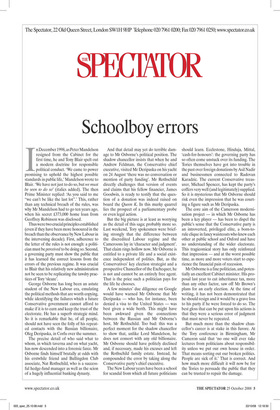Schoolboy errors
In December 1998, as Peter Mandelson resigned from the Cabinet for the first time, he and Tony Blair spelt out a modern doctrine for responsible political conduct. ‘We came to power promising to uphold the highest possible standards in public life,’ Mandelson wrote to Blair. ‘We have not just to do so, but we must be seen to do so’ (italics added). The then Prime Minister replied: ‘As you said to me “we can’t be like the last lot”.’ This, rather than any technical breach of the rules, was why Mr Mandelson had to go ten years ago, when his secret £373,000 home loan from Geoffrey Robinson was disclosed.
Thus were two crucial principles established (even if they have been more honoured in the breach than the observance by New Labour in the intervening decade). First, adherence to the letter of the rules is not enough: a politician must be perceived to be doing so. Second, a governing party must show the public that it has learned the correct lessons from the errors of the previous regime. It was crucial to Blair that his relatively new administration not be seen to be replicating the tawdry practices of Tory ‘sleaze’.
George Osborne has long been an astute student of the New Labour era, emulating the political methods that are worth copying, while identifying the failures which a future Conservative government cannot afford to make if it is to earn and keep the trust of the electorate. He has a superb strategic mind. So it is remarkable that he, of all people, should not have seen the folly of his repeated contacts with the Russian billionaire, Oleg Deripaska, in Corfu over the summer.
The precise detail of who said what to whom, in which taverna and on what yacht, has now descended into a forensic farce. Mr Osborne finds himself brutally at odds with his erstwhile friend and Bullingdon Club associate, Nat Rothschild, who is a successful hedge-fund manager as well as the scion of a hugely influential banking dynasty. And that detail may yet do terrible damage to Mr Osborne’s political position. The shadow chancellor insists that when he and Andrew Feldman, the Conservative chief executive, visited Mr Deripaska on his yacht on 24 August ‘there was no conversation or mention of party funding’. Mr Rothschild directly challenges that version of events and claims that his fellow financier, James Goodwin, is ready to testify that the question of a donation was indeed raised on board the Queen K. In this murky quarrel lies the prospect of a parliamentary probe or even legal action.
But the big picture is at least as worrying as the detail of this saga; probably more so. Last weekend, Tory spokesmen were briefing strongly that the difference between the discredited Labour regime and the Cameroons lay in ‘character and judgment’. That claim rings hollow now. Mr Osborne is entitled to a private life and a social existence independent of politics. But, as the Conservatives’ key election strategist and a prospective Chancellor of the Exchequer, he is not and cannot be an entirely free agent. That is the price such a politician pays for the life he chooses.
A few minutes’ due diligence on Google would have warned Mr Osborne that Mr Deripaska — who has, for instance, been denied a visa to the United States — was best given a wide berth. This might have been awkward given the connections between the Russian and Mr Osborne’s host, Mr Rothschild. Too bad: this was a perfect moment for the shadow chancellor to show that, unlike Lord Mandelson, he does not consort with any old billionaire. Mr Osborne should have politely declined and, if necessary, made his excuses and left the Rothschild family estate. Instead, he compounded the error by taking along the Conservative party’s chief executive.
The New Labour years have been a school for scandal from which all future politicians should learn. Ecclestone, Hinduja, Mittal, ‘cash-for-honours’: the governing party has so often come unstuck over its funding. The Tories themselves have got into trouble in the past over foreign donations by Asil Nadir and businessmen connected to Radovan Karadzic. The current Conservative treasurer, Michael Spencer, has kept the party’s coffers very well (and legitimately) supplied. So it is mysterious that Mr Osborne should risk even the impression that he was courting a figure such as Mr Deripaska.
The core aim of the Cameroon modernisation project — in which Mr Osborne has been a key player — has been to dispel the public’s sense that the Conservative party is an introverted, privileged elite, a born-torule clique in fancy waistcoats who knew each other at public school and Oxford and have no understanding of the wider electorate. This tragicomical story has only reinforced that impression — and at the worst possible time, as more and more voters start to experience the financial pain of recession.
Mr Osborne is a fine politician, and potentially an excellent Cabinet minister. His proposal last year to cut inheritance tax, more than any other factor, saw off Mr Brown’s plans for an early election. At the time of writing, it has not been demonstrated that he should resign and it would be a grave loss to his party if he were forced to do so. The best gloss that can be put upon his actions is that they were a serious error of judgment that must never be repeated.
But much more than the shadow chancellor’s career is at stake in this furore. At the Tory conference in Birmingham, Mr Cameron said that ‘no one will ever take lectures from politicians about responsibility unless we put our own house in order. That means sorting out our broken politics. People are sick of it.’ That is correct. And how much more difficult it will now be for the Tories to persuade the public that they can be trusted to repair the damage.


















































































 Previous page
Previous page